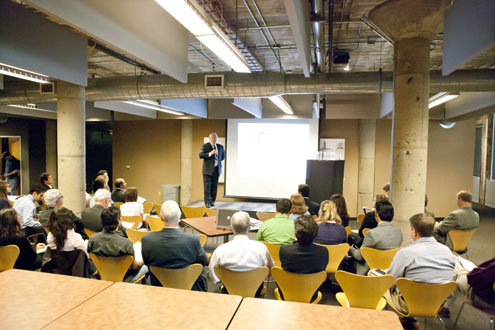DALLAS – Students from Texas A&M University, Texas Tech University and University of Texas at Arlington worked with design, construction and engineering industry leaders to explore novel ideas and concepts in building design.
Research findings were presented at a Design Research Collaborative awards function, held at HKS’s headquarters in Dallas, on October 12 from 2 p.m. to 4 p.m. Prizes of $1,000, $600 and $400 were awarded to the top three finalists.
Nicholas P. Gignac, from Texas A&M University, took first place for his “Application of Horizontal Light Pipes in Levels Below Grade” study. He examined the architectural integration of the EPA award-winning light-tube daylighting technology in basement spaces and energy conservation resulting from such applications. It was found that the concept, jointly applied to a ground floor and basement in a two-story building, predicts a reduction in overall electricity usage by 16.55 percent.
A work group from the University of Texas at Arlington – including Lance Abaya, Alex Dahm, Irving Gatica, Jon Holden, Patrick Kratz, Soid Manzano, Jared Nance, Varia Smirnova and Heather Stoker received second place recognition. The group examined the capacity for architectural design to leverage the use of digital technology to respond to social and practical issues related to engaging and educating elementary school children. Specifically, the study illustrates how digital technology can be applied to provide highly efficient yet customizable design solutions for costs competitive to traditional forms of construction. Parametric modeling, digital fabrication and sustainability principles helped develop this cost-efficient solution for the REAL School Gardens, a non-profit organization in the Dallas-Fort Worth area established to create an educational program for underprivileged neighborhoods.
In third place, Seher Zunaira from Texas A&M University researched “Solving Daylighting Issues in Deep Plan Office Buildings.” She examined performance enhancement of passive light-shelve technology by using active reflectors in deep-plan office spaces. It was found that an active collector can prove to be an efficient mechanism in improving daylight provision in deep core spaces like schools and offices.
According to Debajyoti Pati, Ph.D., FIIA, LEED AP, director of research with HKS, the Design Research Collaborative Program was created to pair industry and academic talents to cultivate a culture that encourages a knowledge-seeking attitude, enabling innovative products and services. “During the 2009 spring semester, we asked students to team with industry professionals on a variety of topics – from alternative energy systems to innovative building materials. These papers were reviewed by a jury of top industry leaders.”
Design Research Collaborative Program jurors included Dan Noble, FAIA, FACHA, LEED AP, executive vice president, HKS, Inc., Dallas, Texas; Ana Pinto-Alexander, president, Margatti Interiors, Indianapolis, Ind.; Wilfried Laufs, Ph.D., P.E., LEED AP, vice president, Thornton Tomasetti, New York, NY; Anthony Martin, P.E., LEED AP, Henderson Engineers, Inc, Addison, Texas; and Dr. Michael O'Neill senior director of workplace research, Knoll, Inc., East Greenville, Penn.
Two students received honorable mentions for their submissions. “Developing Site Response: A Study in Linear Planning” was presented by Jesse Garland with Texas Tech University. Esmeraldo Dazo Conanan VII, with Texas Tech University, examined “Emergency Department Expansions and Campus Improvement.”
“We must encourage students to explore innovations in building systems and design,” said Noble. “It’s their future. We need them to lead the newest generation of architects, engineers and contractors into the next era of building – which will take place on a competitive, high-tech, global scale.”
The Design Research Collaborative Program is a work group within HKS’s Center for Advanced Design Research and Evaluation (CADRE), a non-profit, 501(c)(3) status agency conducting architectural research and education.

HKS, Inc. is a leading architectural design firm ranked among the top-four architectural/engineering firms, according to Building Design+Construction magazine and among the top-seven architectural firms, according to BD World Architecture magazine. Since its founding in 1939, HKS has completed construction projects totaling more than $66 billion in more than 1,038 cities located in 46 states, the District of Columbia and 64 foreign countries. The firm operates from 23 worldwide offices.